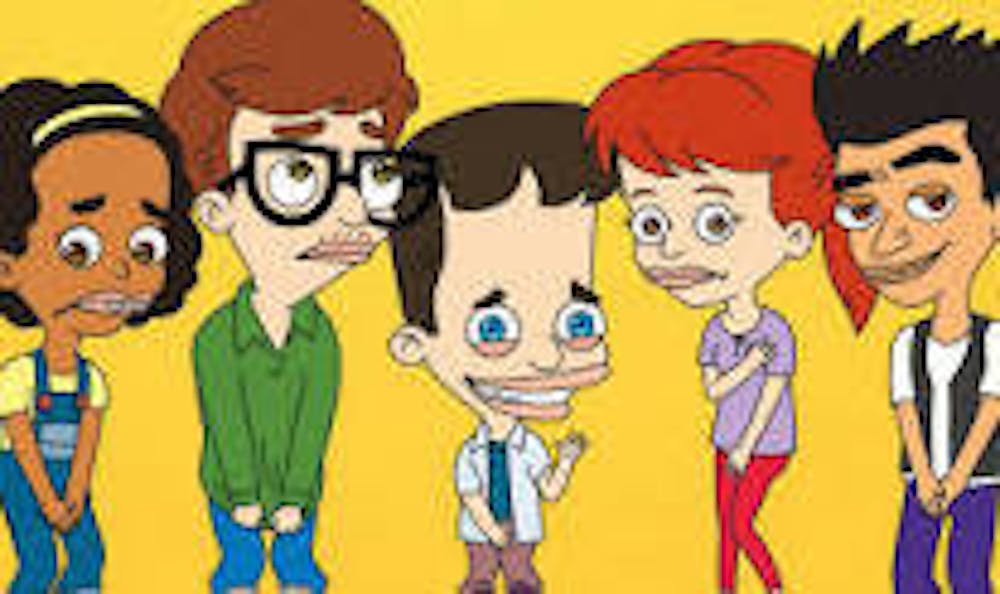Writing a content warning for Big Mouth feels almost impossible, but please be warned that this article will discuss a lot of things that are very disgusting and exceedingly sexual, the vast majority of which involve cartoon characters between the ages of 12 and 14.
We all have movies or shows that we love, and we all relate to each of them in different ways. There are some shows that we adore so much, we simply can’t conceive of how anybody wouldn’t feel the same way. For me, that’s Brooklyn Nine-Nine. For some it’s The Office, and for others it might be Gilmore Girls. These shows speak to us so deeply and make us so happy, it just doesn’t compute that others might enjoy them any less than we do. They almost become a part of our identity. Sometimes, the fact that other people don’t like our show actually offends us.
Big Mouth, which recently debuted its fourth season on Netflix, has never been that show — not for me and probably not for anybody. It’s indescribably inappropriate, aggressively uncomfortable and, at times, profoundly disturbing and upsetting. Believe me, if you don’t like it, I get that. However, it’s also probably the show that makes me laugh the longest and the hardest.
I wouldn’t call Big Mouth a guilty pleasure. It’s far too popular of a show for that title to be appropriate. However, it certainly makes you feel guilty. Big Mouth will often openly accuse you, the viewer, of deep depravity as you laugh along at its jokes. In this season there’s a gag where the writers introduce another fake show taking place in the same universe only for the two main characters to question its existence. Who would watch a show about middle-schoolers that so assertively focuses on sex? Of course, as the viewer, you know the answer: It’s you.
Sometimes, it’s that brazenness which shocks you more than any of the numerous cartoon genitalia (both male and female) in the show. The show has always relied upon the comic staple of breaking the fourth wall. Characters refer to events as setting up the next season and just talk directly to the audience. They talk about the show itself quite frequently as well.
There are more subtle examples too, though. Andrew Glouberman, voiced by John Mulaney, has a line that’s a direct quote from one of Mulaney’s Netflix stand-up specials. Missy Foreman-Greenwald, a mixed-race character, explains to her cousin that she “really” can’t say the N-word, a joke based on the announcement over the summer that her original voice actress, Jenny Slate, would step down so that Missy could be voiced by Ayo Edebiri, a Black actress. The change occurs later in the season and goes over pretty seamlessly.
Self-referential humor and grotesque cartoon visuals are Big Mouth’s bread and butter. Like season three, this season does its best to expand and test out new subject matter and different creative ideas. Sometimes they work, and other times they work less. Some viewers may enjoy the variety more than others, but I personally felt that the show thrived the most when it stuck to its already absurd roots. The writing is always tremendous, but it can occasionally lose track of itself and its fundamental message: Puberty is weird and funny, and we’re going to make it weirder and funnier.
That being said, this season did explore some new topics and issues in interesting and humorous ways. Newly introduced Natalie is the show’s first transgender character, and though she’s only in the show for the first four episodes, she’s a good addition for sure. An episode devoted entirely to hand jobs is certainly unique and definitely hilarious. The same could perhaps be said of the scene in which Andrew masturbates in the same room as his dead grandfather, but, well, I have to admit that scene was a bit much for me.
The show also addressed some other new serious topics besides being transgender. In particular, this season focused heavily on anxiety through the addition of new character “the anxiety mosquito” and depression, as well as the importance and scary nature of emotional vulnerability. Matthew, the show’s first gay character (several characters in the show aren’t straight, but unlike most, Matthew was openly gay from the first episode of season one), has several scenes with his religious Christian parents that range from difficult and uncomfortable to beautiful and moving.
In that sense, Big Mouth season four shines in the same way that the three previous seasons did. It aggressively pairs significant concepts and issues with excessively grotesque and sexual comedy. It is unabashedly gross but also incredibly clever and hilarious. I cried from laughter several times while watching this season, but I also cried a couple of times just because what was happening genuinely made me emotional. The final scene of the season was particularly heartfelt and empowering, even if it did substantially involve a lost soul entering someone else’s body through their rectum.
So, if you had trouble just getting through the descriptions in this article, then maybe Big Mouth isn’t for you. I love it, I have a lot of friends who love it, but I know a good amount of people who find it utterly unwatchable. That’s okay. We often express ourselves through the media or art that we particularly enjoy, and that’s fine. Sometimes, though, it’s good to take a step back and understand that just because you find a 13-year-old sucking the mud off a 12-year-old’s toes funny, it’s more than acceptable if someone else just isn’t that interested. Even if you hate it, I promise I won’t mind.
Please don’t criticize Brooklyn Nine-Nine within earshot of me, though.

















